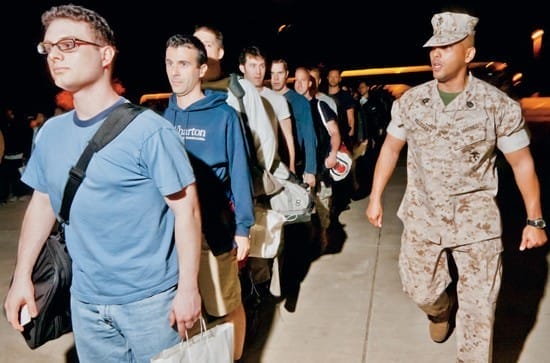Do Wharton MBA students have true grit? The answer was demonstrated in mid-April when 90 students volunteered to participate in a 24-hour, specially designed Marine Corps boot camp program. Their objective was to strengthen their leadership mettle—physically, emotionally, and intellectually.
 Leadership training cannot be dispensed solely from a textbook. Wharton’s Leadership Ventures, of which Quantico is but one of 13 destinations around the world, offer an array of challenging, experiential situations. now in its 10th year, Preston B. Cline, senior associate director of Wharton’s Leadership Ventures, explains: “Cutting-age companies which have adopted a team-based approach have proved to be the most successful and are believed to be the paradigms of the future. The business community is proving to be very dynamic and our graduates are required to be team oriented, quickly adaptive to changes in the business climate, and highly resilient when plans go awry.” He continues, “One of the unique things about some of the Wharton students is that they have faced a lot of academic success and so are, therefore, less equipped at recovering from failure. So to counteract those life experiences, opportunities for failure are built into the programs.”
Leadership training cannot be dispensed solely from a textbook. Wharton’s Leadership Ventures, of which Quantico is but one of 13 destinations around the world, offer an array of challenging, experiential situations. now in its 10th year, Preston B. Cline, senior associate director of Wharton’s Leadership Ventures, explains: “Cutting-age companies which have adopted a team-based approach have proved to be the most successful and are believed to be the paradigms of the future. The business community is proving to be very dynamic and our graduates are required to be team oriented, quickly adaptive to changes in the business climate, and highly resilient when plans go awry.” He continues, “One of the unique things about some of the Wharton students is that they have faced a lot of academic success and so are, therefore, less equipped at recovering from failure. So to counteract those life experiences, opportunities for failure are built into the programs.”


At Quantico, the students are placed in a fireteam (a group of four or five), one of whom is designated the leader. The leadership role is rotated in each of the challenges. The mission is timed. In some instances it might be to transport a wounded comrade across a hazardous route and over a barrier, or to transport a heavy box of ammunition across a series of platforms. The leader has to make quick decisions under adverse conditions and develop new strategies when necessary.


Bryan McCoy, one of the Wharton students, recalls, “We had a series of very difficult challenges. The designated leader of the fireteam of each challenge quickly assessed the problem, devised a plan making use of a limited supply of boards and rope. and gave orders to the team. Inevitably, we failed. We would lose one of our boards in the water and a team member would fall in and was eliminated. Afterwards, we had a debriefing by a Marine observer who analyzed our leadership execution and team performance.” He continues, “I was comfortable being a team member, but I prefer to be a leader.”


Semper Fidelis
 Wharton student Robert Seo traveled down to Quantico in April with his classmates but did not endure the hazing or the leadership challenges. That’s because he is a Marine. He enlisted in the Marine Reserve in 2000, while he was an undergraduate at the University of Maryland. He was deployed to Iraq in 2003, returned and earned his degree and then trained for and competed in a triathlon in Brazil. Following a stint in investment banking he enrolled in Wharton’s MBA program, where he became a Fellow in Wharton’s Leadership Ventures. It was his job to coordinate the trip to Quantico and act as a facilitator on site. What did the students learn in the program? He says, “I hope they learned how to react when things aren’t going well. Do you freeze? Shut down? No, you readjust quickly and carry on. In the Marines we teach that a 70 percent solution now is better than a 100 percent solution later.” Semper Fidelis —always faithful.
Wharton student Robert Seo traveled down to Quantico in April with his classmates but did not endure the hazing or the leadership challenges. That’s because he is a Marine. He enlisted in the Marine Reserve in 2000, while he was an undergraduate at the University of Maryland. He was deployed to Iraq in 2003, returned and earned his degree and then trained for and competed in a triathlon in Brazil. Following a stint in investment banking he enrolled in Wharton’s MBA program, where he became a Fellow in Wharton’s Leadership Ventures. It was his job to coordinate the trip to Quantico and act as a facilitator on site. What did the students learn in the program? He says, “I hope they learned how to react when things aren’t going well. Do you freeze? Shut down? No, you readjust quickly and carry on. In the Marines we teach that a 70 percent solution now is better than a 100 percent solution later.” Semper Fidelis —always faithful.




























